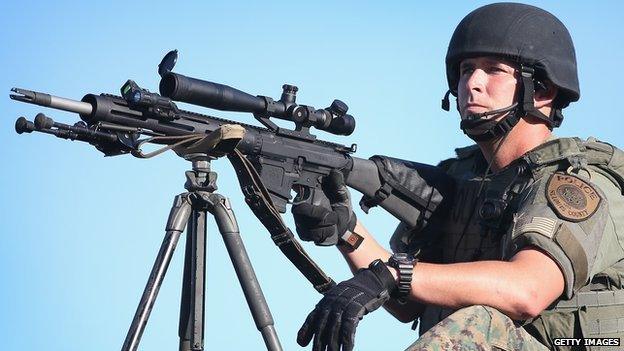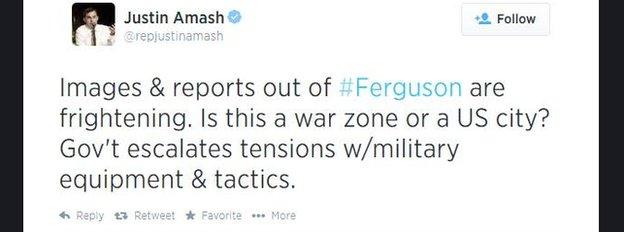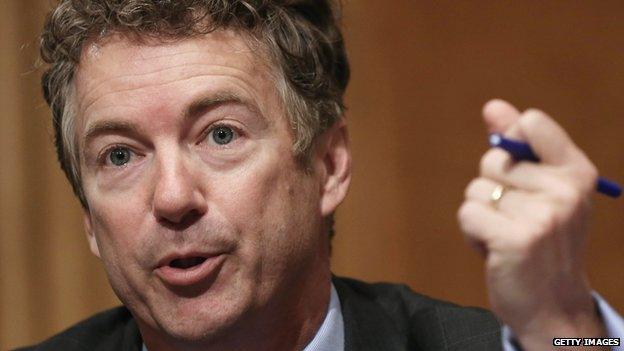Is Ferguson the start of a 'libertarian moment'
- Published
- comments

Much of the commentary on the unrest in Ferguson, Missouri, following the shooting death of Michael Brown by a police officer has been dominated by liberal outrage over what some see as racial injustice.
There is, however, a growing chorus from the conservative movement's libertarian wing that connects the perceived overreaction by a militarised local law enforcement to their critique of the heavy-handed power of government.
"The state is big and powerful and violent and can hurt you, whether it's the FDA, the state prosecutor or the local police force," writes, external Hot Air blog's Mary Katharine Ham, concisely summarising the gist of this libertarian argument.

Breitbart's John Nolte puts it, external a bit more sharply: "The media hate police but without them, who will ultimately force us to buy ObamaCare and confiscate our guns?"
On Wednesday night Congressman Justin Amash, a libertarian-leaning Republican embraced by the grass-roots Tea Party movement, tweeted, external that the news from Ferguson was "frightening", asking: "Is this a war zone or a US city? Gov't escalates tensions w/military equipment & tactics."
One of the leading figures in today's libertarian movement, Kentucky Senator Rand Paul, offers his take, external in an opinion piece for Time magazine on Thursday afternoon:
"When you couple this militarisation of law enforcement with an erosion of civil liberties and due process that allows the police to become judge and jury - national security letters, no-knock searches, broad general warrants, pre-conviction forfeiture - we begin to have a very serious problem on our hands…
"Americans must never sacrifice their liberty for an illusive and dangerous, or false, security. This has been a cause I have championed for years, and one that is at a near-crisis point in our country."
Reason magazine's Ed Krayewski builds on this theme, external of a militarised police force as the spear-point of an intrusive government, causing more harm than good:
"What's happening in Ferguson certainly looks like a counter-insurgency," he writes. "If cops keep it up long enough, some residents might respond with an insurgency. Around the world, insurgencies are fueled by unemployed young men with few prospects. It's the way things like this tend to work, actions and reactions, supply meeting demand, in this case residents filling roles cops seem to be waiting to have filled."
He continues by noting that much of the criticism of law enforcement abuses are instigated by laws that intrude on individual rights.
"Whether they look like it or not, cops will be an occupying force seeking compliance from local residents on behalf of democratically elected central authorities," he writes.

Senator Rand Paul says police have become "judge and jury"
Comments like these mark a sharp break from the previous conservative embrace of government authority when it comes to public safety issues.
"The modern GOP, the one that elected Richard Nixon and built its base in the South and the suburbs, established early on that it was the 'law and order' party," writes, external Slate's David Weigel. "Only recently, as violent crime rates have tumbled, has the libertarian tendency of the GOP reasserted itself."
In Sunday's New York Times magazine cover story, Robert Draper asks, external: "Has the 'libertarian moment' finally arrived?" He cited poll data showing young people embracing smaller, less intrusive government and concluded that the once sidelined ideology could be poised to take control of the Republican Party.
The piece started a debate over libertarianism's current influence within the conservative movement and was criticised from both the right, external and the left, external for being an "unsophisticated, laughable fantasy, external".
That was before Ferguson exploded, night after shocking night. Now, with a few exceptions, external, law-and-order conservatives are silent (look, for instance, at the front page of the conservative commentary site Town Hall, external, where Iraq and Hillary Clinton continue to dominate the conversation).
Perhaps the libertarian moment has arrived after all, borne in the ashes and smoke of Missouri riots.